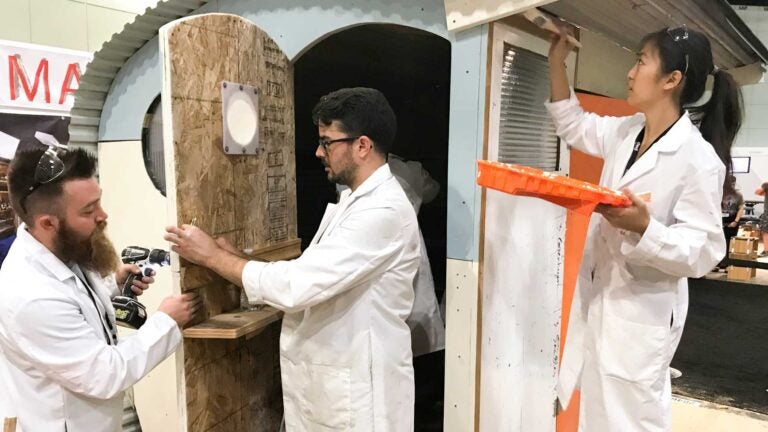
Jeremy Carman, Jayson Champlain and Belinda Pak work on a small shelter for the homeless. (USC Photo/Ron Mackovich)
Tiny shelter built by architecture students could offer a solution to homelessness
Sample house is built with materials from the streets and alleys of L.A., then raffled off to benefit rescue mission
Scraps of wood, appliance parts, a garage door and other odds and ends were hammered and screwed together by USC School of Architecture students. Their finished product: a portable shelter to help the homeless.
Measuring about 6-by-7½ feet, it’s just big enough for a bed, desk, chair and a few personal belongings. Wheels make it movable, while windows let in lots of daylight.
“We’re building a home out of reclaimed garbage, and we let the pieces we find on the street drive the project,” said USC student Jeremy Carman, who hauled scavenged materials in his truck to the Los Angeles Convention Center for the four-day project.
The shelter was raffled off to benefit the Hope of the Valley Rescue Mission and Homes for Hope, a project led by USC School of Architecture lecturer Sofia Borges and Assistant Professor R. Scott Mitchell.
“This shows the students what they can do as architects,” Mitchell said, “because sometimes problems like homelessness are overwhelming.”
Mitchell and Borges have overseen student construction of other tiny houses and sleeping structures as part of the Madworkshop Homeless Studio at the School of Architecture. Their goal is mass production of structurally certified, stackable, dormitory-style units that can be assembled into emergency stabilization communities in Los Angeles, where nearly 58,000 people are homeless. Designed for 90- to 180-day stays, those communities would serve as a bridge to permanent housing.
The latest unit was built at Dwell on Design, an annual design exhibition, and had a simpler goal: to raise awareness about homelessness and connect architecture students directly to solutions.
“When they started, the kids had no construction skills,” Mitchell said. “Now they can find materials, repurpose them and visualize what to do with those and that’s very important to their architectural education.”



